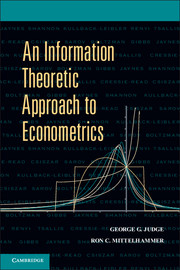Book contents
- Frontmatter
- Contents
- Preface
- One Econometric Information Recovery
- Part I Traditional Parametric and Semiparametric Econometric Models: Estimation and Inference
- Part II Formulation and Solution of Stochastic Inverse Problems
- Part III A Family of Minimum Discrepancy Estimators
- Part IV Binary–Discrete Choice Minimum Power Divergence (MPD) Measures
- Part V Optimal Convex Divergence
- Eleven Choosing the Optimal Divergence under Quadratic Loss
- Twelve Epilogue
- Abbreviations
- Index
Twelve - Epilogue
from Part V - Optimal Convex Divergence
Published online by Cambridge University Press: 05 June 2012
- Frontmatter
- Contents
- Preface
- One Econometric Information Recovery
- Part I Traditional Parametric and Semiparametric Econometric Models: Estimation and Inference
- Part II Formulation and Solution of Stochastic Inverse Problems
- Part III A Family of Minimum Discrepancy Estimators
- Part IV Binary–Discrete Choice Minimum Power Divergence (MPD) Measures
- Part V Optimal Convex Divergence
- Eleven Choosing the Optimal Divergence under Quadratic Loss
- Twelve Epilogue
- Abbreviations
- Index
Summary
Building on the traditional conceptual econometric base, this book has been concerned with how one goes about learning from a sample of indirect noisy observations and the corresponding econometric model, defined in terms of an ill-posed inverse problem. To develop a plausible basis for reasoning that recognizes the generally limited knowledge characteristics of the econometric enterprise, we have demonstrated a range of nontraditional methods of information recovery. The nature of indirect noisy observational sample data, together with an evaluation of the often meager informational base that exists on which to specify an empirical econometric model, leads naturally to changes in the way econometric models should be defined and the method by which estimation and inference can be conducted. In addressing this state of affairs, we introduced families of divergence measures and associated new families of likelihood functions to provide alternative bases for estimation and inference in a range of econometric problems. These methods have evolved over the past two decades and are gradually being evaluated by the arrow of time.
As noted in Chapter 1, many traditional econometric methods are not designed to cope with the special characteristics of economic data and the implied corresponding ill-posed stochastic inverse problem. A case in point is current attempts in economics to identify causal effects from observed data–statistical evidence. From an econometric point of view, the causal effects problem (determining unknown causes) involves the solution to a stochastic inverse problem based on indirect noisy observations of their effects. This sounds a lot like the semiparametric stochastic estimation and inference problem we introduced and sought a solution to in Chapters 4 and 5 and developed in the remaining chapters of the book.
- Type
- Chapter
- Information
- An Information Theoretic Approach to Econometrics , pp. 221 - 222Publisher: Cambridge University PressPrint publication year: 2011
- 3
- Cited by



